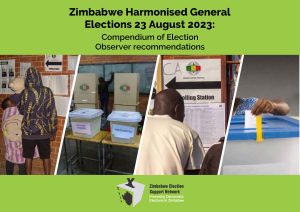Assessment:
A review high profile cases brought before the judicial courts after the harmonised elections for the 2008, 2013 and 2018 electoral cycles can help us make an assessment of the role that the judiciary has been playing towards the achievement, maintenance and promotion of electoral democracy in Zimbabwe[1]. The judiciary has a role to play in electoral reforms, through adjudication, dispute resolution and recommending legislative and institutional reforms. For Zimbabwe, the judiciary continue to miss, or deliberately evade this important role, thereby proving incapacitated to contribute to meaningful electoral reforms in Zimbabwe.
A general assessment is that the judiciary has not pushed for electoral reforms; they have not caused any meaningful or progressive movement in the quest for comprehensive electoral reforms.
In high profile cases, the judiciary has either shied away from comprehensive adjudication by hiding behind technical, procedural prerequisites instead of seizing the moment to develop jurisprudence for use by Parliament and citizens
[1] The full list of court cases reviewed can be found in the ZESN research paper entitled “Assessment of the Justice Delivery System and its Contribution to Electoral Reforms in Zimbabwe”.
